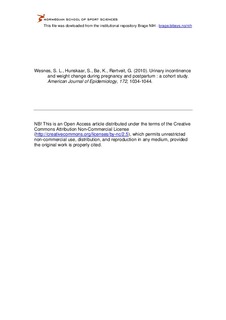| dc.contributor.author | Wesnes, Stian Langeland | |
| dc.contributor.author | Hunskaar, Steinar | |
| dc.contributor.author | Bø, Kari | |
| dc.contributor.author | Rørtveit, Guri | |
| dc.date.accessioned | 2011-01-12T09:36:12Z | |
| dc.date.available | 2011-01-12T09:36:12Z | |
| dc.date.issued | 2010-08-20 | |
| dc.identifier | Seksjon for idrettsmedisinske fag / Department of Sports Medicine | |
| dc.identifier.citation | American Journal of Epidemiology. 2010, 172(9), 1034-1044 | en_US |
| dc.identifier.issn | 0002-9262 | |
| dc.identifier.uri | http://hdl.handle.net/11250/170657 | |
| dc.description | This is an Open Access article distributed under the terms of the Creative Commons Attribution Non-Commercial License (http://creativecommons.org/licenses/by-nc/2.5), which permits unrestricted non-commercial use, distribution, and reproduction in any medium, provided the original work is properly cited. | en_US |
| dc.description.abstract | Weight gain during pregnancy may contribute to increased urinary incontinence (UI) during and after pregnancy, but scientific support is lacking. The effect of weight loss on UI postpartum is unclear. From 1999 to 2006, investigators in the Norwegian Mother and Child Cohort Study recruited pregnant women during pregnancy. This study was based on 12,679 primiparous women who were continent before pregnancy. Data were obtained from questionnaires answered at weeks 15 and 30 of pregnancy and 6 months postpartum. Weight gain greater than the 50th percentile during weeks 0–15 of pregnancy was weakly associated with higher incidence of UI at week 30 compared with weight gain less than or equal to the 50th percentile. Weight gain greater than the 50th percentile during pregnancy was not associated with increased prevalence of UI 6 months postpartum. For each kilogram of weight loss from delivery to 6 months postpartum among women who were incontinent during pregnancy, the relative risk for UI decreased 2.1% (relative risk = 0.98, 95% confidence interval: 0.97, 0.99). Weight gain during pregnancy does not seem to be a risk factor for increased incidence or prevalence of UI during pregnancy or postpartum. However, weight loss postpartum may be important for avoiding incontinence and regaining continence 6 months postpartum. | en_US |
| dc.language.iso | eng | en_US |
| dc.publisher | Oxford University Press | en_US |
| dc.subject | cohort studies | en_US |
| dc.subject | parity | en_US |
| dc.subject | postpartum period | en_US |
| dc.subject | pregnancy | en_US |
| dc.subject | urinary incontinence | en_US |
| dc.subject | weight gain | en_US |
| dc.subject | weight loss | en_US |
| dc.title | Urinary incontinence and weight change during pregnancy and postpartum: a cohort study | en_US |
| dc.type | Journal article | en_US |
| dc.type | Peer reviewed | en_US |
| dc.subject.nsi | VDP::Medical disciplines: 700::Health sciences: 800 | en_US |
| dc.source.pagenumber | 1034-1044 | en_US |
